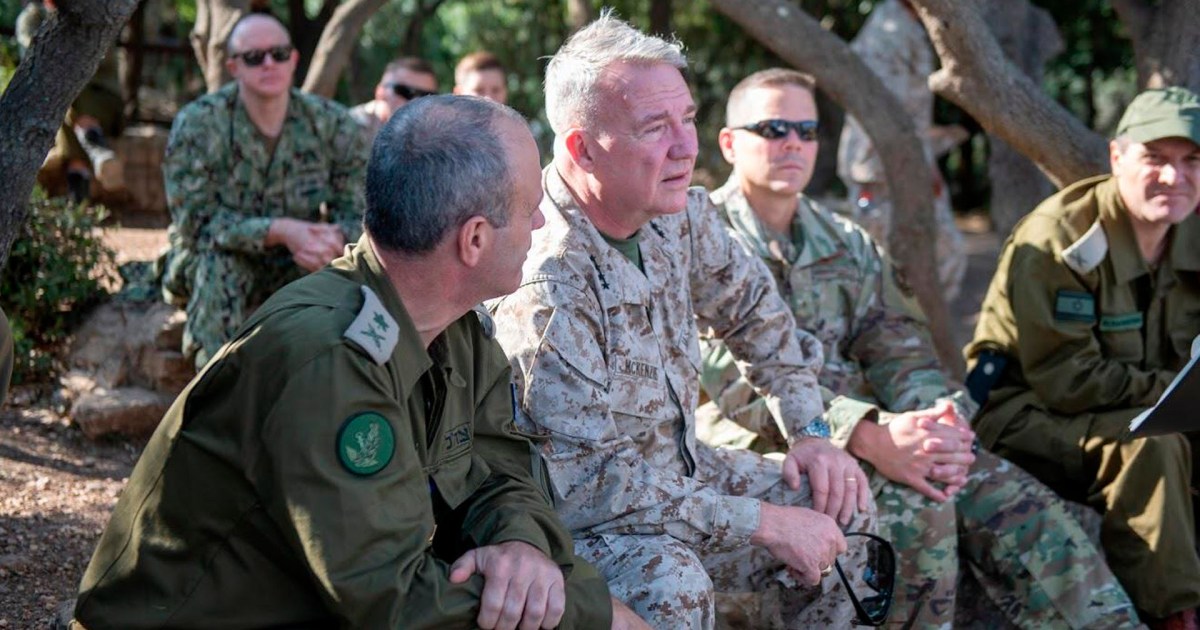The commander of the US Central Command, General Kenneth MacKenzie, began talks in Israel, including the Iranian nuclear file, a day after Tel Aviv threatened to strike Iranian nuclear facilities to prevent Tehran from acquiring a nuclear weapon.
MacKenzie met Thursday evening in Tel Aviv, Chief of Staff of the Israeli Army, Aviv Kochavi, who was speaking on Wednesday about plans to strike Iranian nuclear facilities, and is supposed to meet other Israeli officials.
Kohavi said - during his meeting with McKinsey - that the bilateral strategic and military relations are an essential and crucial component in enhancing Israeli national security and its qualitative superiority.
And he considered that this partnership is a key to dealing with all threats, especially the Iranian threat.
The Israeli army said - in a statement - that the meeting discussed developments in the Middle East and the consolidation of the strategic partnership between the two sides.
The US military commander arrived in Israel on the first visit since Israel moved to US Central Command operations.
McKinsey’s visit is the first since Biden took office, and since the transfer of Israel to Central Command operations, after years during which it was under the command of the US military in Europe.
This visit comes after statements by the Israeli Chief of Staff, in which he talked about military plans aimed at preventing Iran from developing a nuclear bomb.
Tehran responded to Kochavi's statements - in which he called on the Israeli army to prepare to strike Iranian nuclear facilities - by responding forcefully to any Israeli attack.
The spokesman for the Iranian Chief of Staff, Abu al-Fadl Shikaraji, went so far as to threaten to strike the cities of Tel Aviv and Haifa, and to "level them with the ground" if Israel implemented its plans, while other Iranian officials emphasized that the Israeli statements came as part of what they described as a "psychological war."
"Malicious acts"
In conjunction with McKinsey's visit to Israel, US Defense Department spokesman John Kirby said Wednesday that Iran continues to carry out "malicious acts" in the region and poses a threat there. He also confirmed that Iran has an active ballistic missile program.
Earlier, Washington sent for the sixth time a B-52 bomber (B-52) to the Middle East to deter what it described as possible aggression, in the context of tension for some time over speculation of a possible Iranian response to the assassination of the former commander of the Iranian Quds Force, Qassem Soleimani. And the chief Iranian atomic scientist, Mohsen Fakhrizadeh.
On the other hand, Iran conducted a series of military maneuvers this month, during which it launched new missiles, some of them designed to target warships, and "suicide" drones have been tested, according to what Iranian media reported.
Tensions escalated between Iran and the United States before the inauguration of US President Joe Biden as president to succeed President Donald Trump, who pursued a policy of pressure on Tehran by withdrawing Washington from the nuclear deal and imposing economic sanctions, with the exchange of fiery statements between the two countries.

